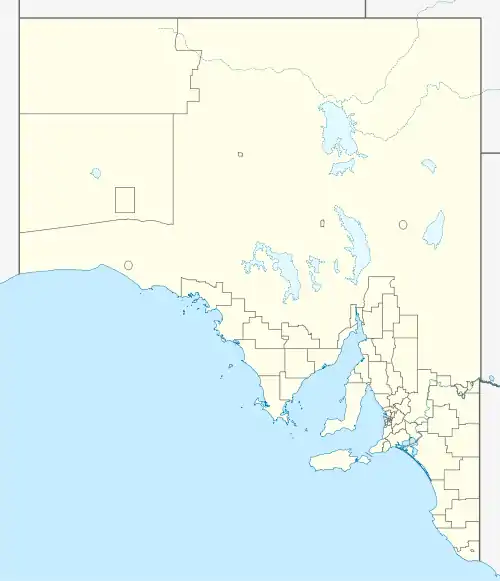The Pages Conservation Park
The Pages Conservation Park is a protected area in the Australian state of South Australia which is associated with the island group known as The Pages located in Backstairs Passage about 25 kilometres (16 miles) south-east of Cape Jervis and about 98 kilometres (61 miles) south south-west of the state capital of Adelaide.[2][5]
| The Pages Conservation Park South Australia | |
|---|---|
IUCN category Ia (strict nature reserve)[1] | |
 The Pages Conservation Park | |
| Nearest town or city | Cape Jervis[2] |
| Coordinates | 35°46′17″S 138°17′42″E[1] |
| Established | 16 March 1967[3] |
| Area | 70.23 km2 (27.1 sq mi)[4] |
| Visitation | 'few visitors' (in 1983)[5] |
| Managing authorities | Department for Environment and Water |
| See also | Protected areas of South Australia |
The conservation park consists of the island group and adjoining waters.[2] The islands first acquired protected area status as a fauna conservation reserve proclaimed under the Crown Lands Act 1929.[4][3] On 27 April 1972, the fauna conservation reserve was reconstituted as The Pages Conservation Park under the National Parks and Wildlife Act 1972.[6] On 24 December 1997, the boundary of the conservation park was extended 2 nautical miles (3.7 km) seawards in order to control berleying associated with both shark cage diving and shark fishing.[7][8] As of 2018, it covered an area of 70.23 square kilometres (27.12 sq mi).[4]
In 1980, the conservation park was described as follows:[9]
Two small islands and a reef which have some aesthetic significance. The islands support a large breeding colony of Australian sea lions and have long been recognised as an important area for seabirds… Two small rocky islands and a reef in Backstairs Passage. The islands are predominantly rock though their relatively flat tops support a low open shrubland of Senecio lautus with widely scattered Atriplex sp and Bulbinopsis bulbosa in small pockets of soil. Steeper slopes support a mat of Disphyma clavellatum and occasional Enchylaena tomentosa…
The isolation, absence of introduced species and only occasional human visits, has ensured habitat preservation.
The conservation park is classified as an IUCN Category IA protected area.[1] In 1980, it was listed on the now-defunct Register of the National Estate.[9]
References
- "Marine Protected Areas in coastal waters of South Australia (refer 'Detailed List' TAB)". CAPAD 2016. Australian government. Retrieved 15 January 2018.
- "Search results for 'The Pages Conservation Park' with the following datasets selected – 'NPW and Conservation Properties', 'State Marine Park Network Zoning' and 'Gazetteer'". Location SA Map Viewer. Government of South Australian. Retrieved 19 January 2019.
- Shard, A. J. (16 March 1967). "CROWN LANDS ACT, 1929-1966: FAUNA CONSERVATION RESERVES DEDICATED" (PDF). THE SOUTH AUSTRALIAN GOVERNMENT GAZETTE. Government of South Australia. pp. 961–962. Retrieved 19 January 2019.
- "Protected Areas Information System Reserve List" (PDF). Government of South Australia. 9 March 2018. Retrieved 26 April 2018.
- Island conservation parks of Backstairs Passage and Encounter Bay management plans (PDF). Adelaide: National Parks and Wildlife Service. 1983. pp. iii, 2 &3. ISBN 0-7243-4588-4.
- "No. 56 of 1972 (National Parks and Wildlife Act, 1972)". The South Australian Government Gazette. Government of South Australia: 660 & 703. 27 April 1972. Retrieved 19 January 2019.
- Armitage, Michael (24 December 1997). "NATIONAL PARKS AND WILDLIFE ACT 1972, SECTION 29 (3): NEPTUNE ISLANDS CONSERVATION PARK, SIR JOSEPH BANKS GROUP CONSERVATION PARK, THE PAGES CONSERVATION (sic) - ALTERATION OF BOUNDARIES" (PDF). The South Australian Government Gazette. Government of South Australian government. p. 1867. Retrieved 19 January 2019.
- Baker, J.L (2004). Towards a System of Ecologically Representative Marine Protected Areas in South Australian Marine Bioregions - Technical Report. Part 3 (PDF). Department for Environment and Heritage, South Australia. p. 421.
- "The Pages Conservation Park, Penneshaw (sic), SA, Australia - listing on the now-defunct Register of the National Estate (Place ID 7418)". Australian Heritage Database. Department of the Environment. 21 October 1980. Retrieved 19 January 2019.
 This article incorporates text by Commonwealth of Australia available under the CC BY 3.0 AU licence.
This article incorporates text by Commonwealth of Australia available under the CC BY 3.0 AU licence.